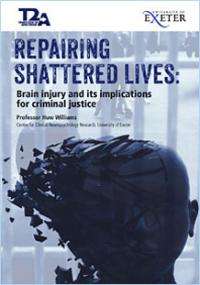Psychology Professor Huw Williams has authored a major new report, published today, on the impact that acquired brain injuries can have on young people in childhood and in their transition to adulthood, and outlines the criminal justice consequences if these injuries go untreated.
"Repairing Shattered Lives: Brain injury and its implications for criminal justice," examines the connection between the 'silent epidemic' of brain injury among young people and crime.
In the report, Professor Huw Williams notes that a shocking 60% of young people in custody report having experienced some kind of traumatic brain injury (TBI). Acquired brain injuries can lead maturing brains to 'misfire,' interrupting the development of temperance (ability to restrain and moderate actions), social judgement and the ability to control impulses. If undetected these injuries, which may be the result of falls, sporting injuries, car accidents or fights, can leave young people untreated and increase their risk of offending.
Report author Professor Huw Williams said: "The young brain, being a work in progress, is prone to 'risk taking' and so is more vulnerable to getting injured in the first place, and to suffer subtle to more severe problems in attention, concentration and managing one's mood and behaviour.
"It is rare that brain injury is considered by criminal justice professionals when assessing the rehabilitative needs of an offender, even though recent studies from the UK have shown that prevalence of TBI among prisoners is as high as 60%. Brain injury has been shown to be a condition that may increase the risk of offending, and it is also a strong 'marker' for other key factors that indicate risk for offending."
The report recommends early intervention to identify and manage brain injuries, including training for school staff, to ensure that young people receive the required neuro-rehabilitative support. "Repairing Shattered Lives" also calls for increased awareness of brain injuries throughout the criminal justice process, including screening of young people as standard.
Commenting on the report, Joyce Moseley OBE, Chair of the Transition to Adulthood Alliance (T2A), said: "The transition to adulthood is difficult enough for all of us, even when we have family and friends to rely on. Add to this the effects of acquired brain injury that this report sets out for us and it becomes clearer and even more important that agencies and practitioners, who will come across such young people within the criminal justice system, know and understand what can and should be done.
"The report makes clear recommendations for service commissioners and providers in the health and criminal justice sectors as to how they should work together to respond appropriately, ensuring that acquired brain injuries are picked up early, treated effectively, and taken into account throughout the criminal justice process."
Another report also published today, by the Office of the Children's Commissioner, identifies the wider impact that brain injuries can have on maturing brains, as well as their social consequences, and adds further weight to the findings by T2A.
Provided by University of Exeter



















